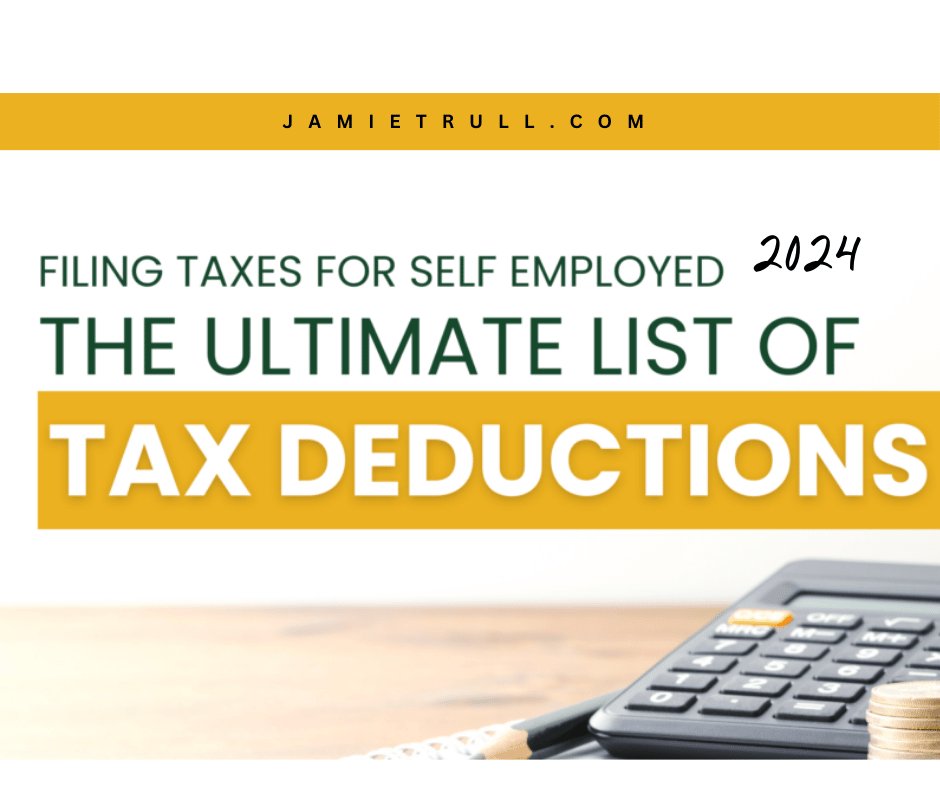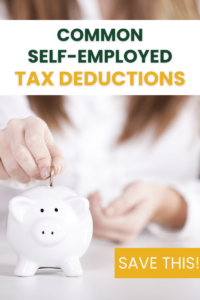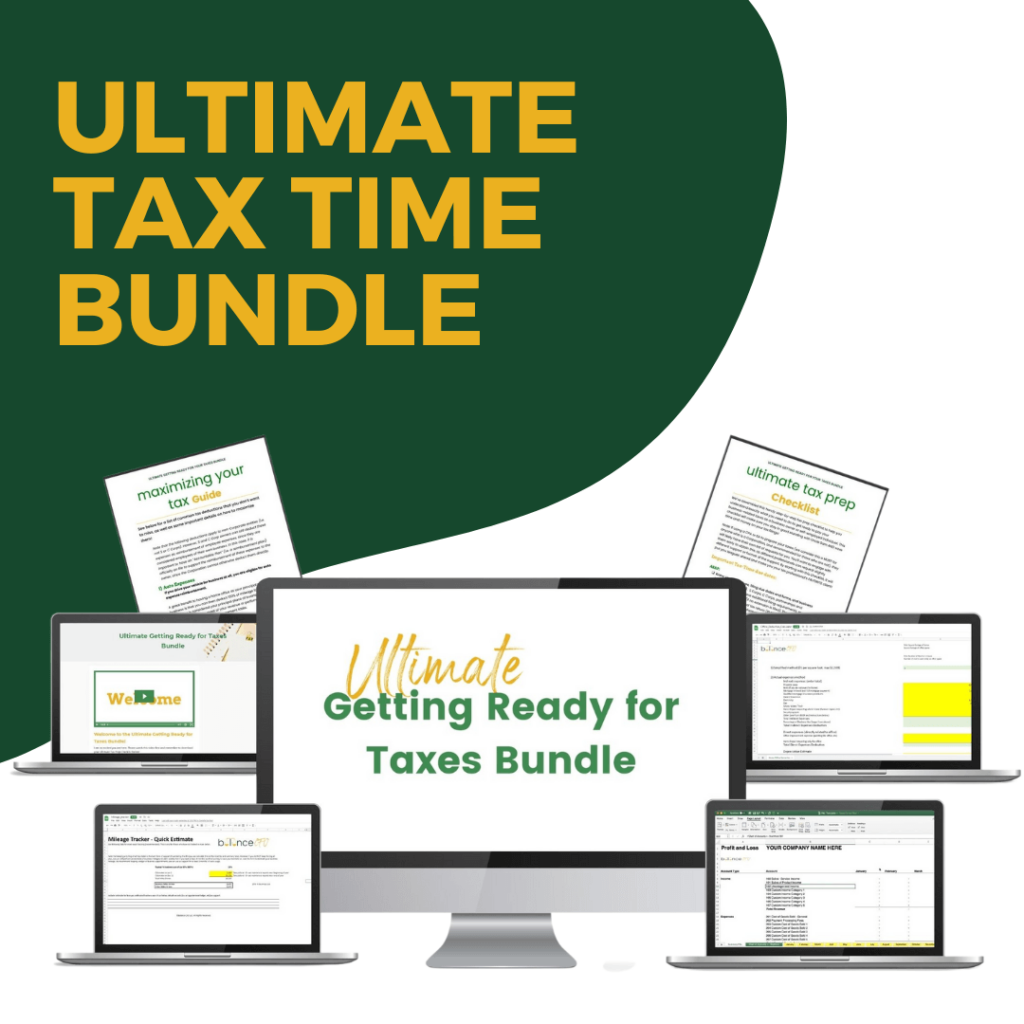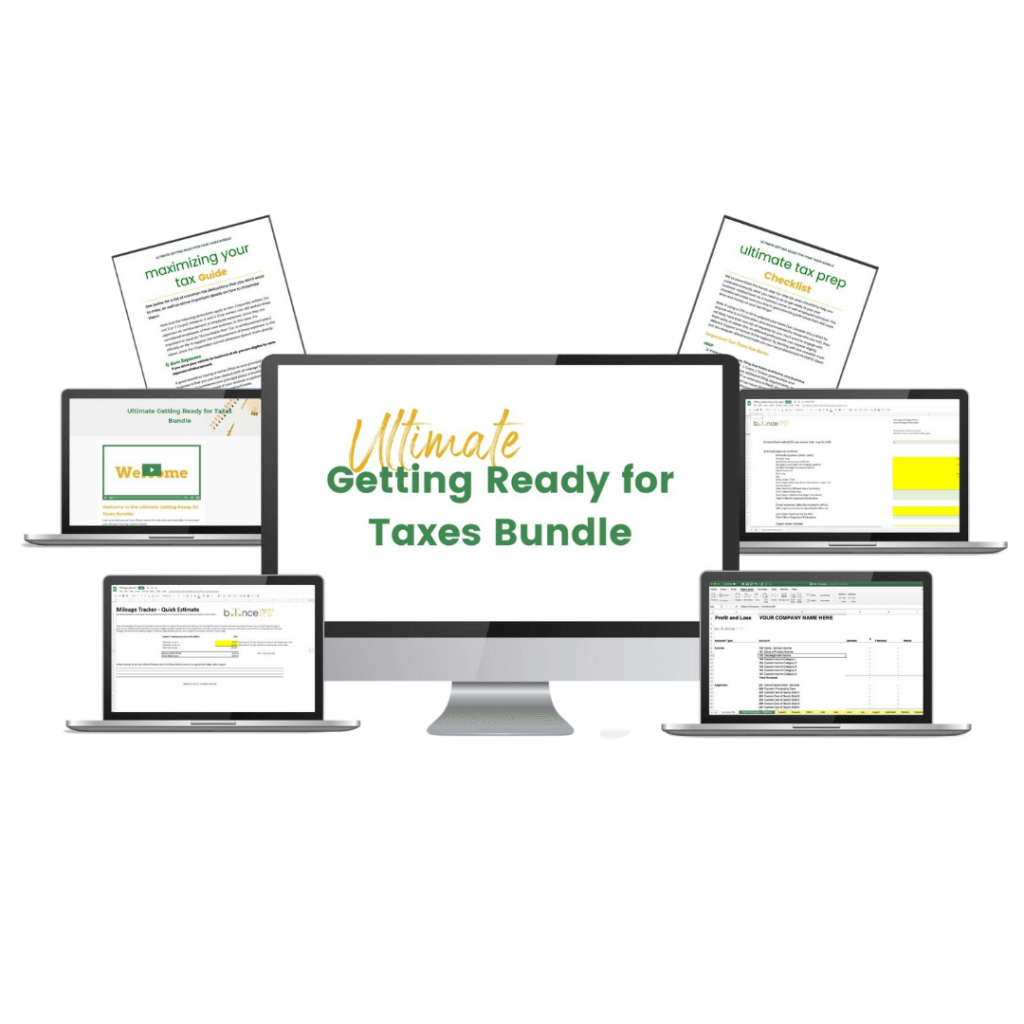
Filing taxes for self employed can feel overwhelming.
But 2023 is the tax year for you to maximize your tax return!
Keeping accurate records of income and expenses is essential when filing taxes as a self-employed individual, especially when it comes to taking advantage of potential deductions and credits.
Tax deductions can help lower your total taxable income and reduce the amount you owe on taxes while also helping you save money.
With that in mind, here’s a comprehensive overview of tax deductions available for self-employed individuals filing taxes in 2023.
How to organize for tax time
Filing taxes is an important part of staying organized and protecting yourself and your business.
Keeping accurate records of business income and expenses, either directly within accounting software or through a Profit and Loss Statement, will ensure complete accuracy when filing taxes.
Doing this allows you to reduce your taxable income with deductions and credits for which your business is eligible.
Ultimately, tracking your business income and your qualified business income deduction or deductions leads to the best possible outcome when filing.
Common self–employed tax deductions

When it comes to getting the maximum amount of benefit from tax deductions, make sure to take into account all the different deductions you can get for your business.
For example, think about how you use your car or phone for both personal and business reasons.
Make sure that you don’t miss out on any deductions associated with those expenses.
There are also travel costs you might be able to claim as well.
It’s important to pay attention to all of these so that you get the most out of the available deductions.
Typical self-employment tax deductions
- Home office expenses
- Health insurance premiums
- Retirement account contributions
- Interest on business loans and credit cards
- Supplies and equipment
- Advertising expenses
- Health insurance premiums
- Mileage and vehicle deductions
- Certain memberships
- Startup costs
- Home office expense help
- Merchant processing fees
- Equipment rental
- Business travel expenses (meals, mileage, etc.)
- Office supplies
- Internet and phone costs
Remember that tax laws can be complex and change at any time, so it is always best to seek out a qualified professional opinion when in doubt.
Take the time to look into each of these deductions
Your accountant can help too, so don’t hesitate to reach out for assistance if you need it.
And finally, don’t forget to keep track of every business expense—both big and small!
Keeping accurate records will make filing taxes easier in the long run, and ideally give you a bigger back tax refund in return.
Self-employment taxes for 1099 contractors
As a 1099 contractor, you will have responsibility for self employment tax and to understand the rules surrounding Social Security and Medicare taxes.
Additionally, you’ll be expected to adhere to any state or local taxes that may be applicable.
Make sure to keep track of all of their income, including any 1099s they receive, in order to ensure accurate reporting when paying taxes.
It’s also a good idea to track all of your income in case someone forgets to send you a 1099.
Ready to get your business expenses organized to pay self employment taxes?

Now, if you’re looking for an easy way to get all your tax documents prepared, I have the ultimate solution for you.
My Ultimate Getting Ready for Taxes Bundle includes extra video lessons, a comprehensive checklist and a deduction maximizer guide to make sure you don’t miss out on any key deductions.
It even comes with plug and play templates like a mileage tracker and profit and loss statement template so you don’t have to start from scratch.
We’ve also included my Home Office Deduction Maximizer to ensure that you claim all the deductions available to you.
Head over now to JamieTrull.com/taxtime and see what offers are available right now!
Want to learn more about getting your business expenses organized?
Watch this video and then grab your copy of our “Ultimate Getting Ready for Taxes Bundle” to ensure you get all of the tax deductions you deserve as a self employed business owner!
This transcript has been edited for readability.
It is a near-verbatim representation of the spoken words and may include colloquial language, grammatical errors, or other inconsistencies. We have chosen to provide the transcript in its raw form to preserve the authenticity of the conversation. We recommend cross-referencing with the original audio or video source for complete accuracy.
Hi everybody. Jamie Trull here, your favorite CPA and financial literacy coach.
Today we’re talking about tax time [for the self employed].
So you may be watching this because you’re self-employed or a small business owner.
You want to make sure that you know what you need to be doing to get ready for taxes.
And make sure that you get all the tax deductions that you are entitled to.
Get fully ready for tax season
So I’m going to give you some quick tips today on what you need to be doing to make sure you are fully ready for taxes and you’re not paying Uncle Sam more than you need to.
Okay?
So the very first thing that you are going to do is to make sure you know what entity type you are that is going to impact what your deadlines are.
You want to make sure you know your tax filings and what you need to file and what the deadlines are for those.
Considerations for S Corps and partnerships
If you are an S Corp or if you are a partnership, you are going have an extra filing due March 15th.
Make sure that you are aware of that.
Otherwise, all of your filings are going to be due on April 15th.
So be really clear on what your entity type is so that you know what your filing dates for tax forms are.
My second tip: make sure that you’re getting your income and expenses together.
That is the key to filing your taxes:making sure that you have a record of your income and your expenses.
So if you’re using accounting software, hopefully you already have that.
If not, it will take a little bit of manual work to put together a profit and loss statement.
That really is just showing your income and your expenses in your business.

Want to know why I say “Run, don’t walk! From QuickBooks for Self-Employed?”
Check out this article ot find out!
What if you are a 1099 contractor?
Now you want to make sure that if you are, let’s say, a self-employed 1099 contractor, that you’re not just relying on your 1099s for your income.
1099s are great when you receive them, but you may not receive all the net earnings from the 1099s that you’re supposed to.
So you need to make sure that you have a way of capturing your own income because you are required to report all of that income.
Offset that income by your business expenses.
So you want to make sure that you’re capturing all your actual business expenses that you had within your business.
That is going to reduce the amount of taxes that you have to pay cuz you’re only going to pay taxes on the net profit piece.
So you want to spend a lot of time making sure that your profit and loss statement or your income and expenses is complete and accurate.
Doing so will make sure that you are staying in good graces with Uncle Sam and not paying more taxes then you need to.
Make sure that you reconcile your income tax amount and expenses
So for example, your bank accounts, you’re going to want to do a reconciliation of your bank accounts.
If you use accounting software, that should be a built-in functionality.
If you’re using something like QuickBooks [maybe insert a link to another article], that’s something that you can do within there.
Otherwise, what you can do to essentially reconcile is to compare what you’re showing in your record of income and expenses versus what your bank account shows.
So you’re going to want to check your bank account if you have invoicing software or something like that that you use.
Make sure that you’re checking against the places that you have this information gathered so you can make sure again, that it’s complete and accurate.
Doing those reconciliations can help you find errors and make sure that you don’t misstate income or misstate expenses.
And additionally, when you’re doing this, you’re going to want to make sure that you are reviewing for reasonableness.
So along with making sure you’re doing those reconciliations, what you’re also doing is making sure that your income and your expenses look right, right?
If you see things coming out of your system that don’t make sense, you’re going to want to follow up on those and make sure that it looks correct.
Next, get your documentation together.
Depending on whether you’re using a tax person or maybe even if you’re not, you’re still going to want to have all the documentation that you need in case you are ever audited by the IRS.
And this is something that you’re going to want to keep on file for at least six years, I generally recommend.
So make sure that you have those receipts.
It’s actually best, I think, if you take a picture of them.
And then you can keep the pictures organized somewhere on your desktop or within your accounting software.
But somewhere where you have support for those business expenses specifically.
You also want to make sure you’ve documented why you consider them to be business expenses, why they are ordinary and necessary in your business.
And this is the kind of support that you’re going to need if you ever are audited, which does happen.
Don’t fall into the trap that you’re too small to ever be audited.
It does happen.
They do audit even the smallest of businesses and a lot of sole proprietors especially will tend to get audited.
Another thing that I recommend doing, especially if you are in January, let’s say, is to make sure that you are paying your estimated taxes.
Estimated taxes are something that are due four times a year.
Maybe you haven’t paid them at all.
Either way, you want to make sure that you’ve paid in on your estimated taxes.
Those are generally due by January 15th each and every year, and you can pay them on the IRS website.
Essentially, when you are a business owner, you have to do your own withholding because the government is not withholding that from the money that you make in most circumstances.
So you want to make sure that you’re paying those [self employment taxes, estimated tax payments, social security and medicare taxes.]
That will help you then to not have additional fines and penalties when you do go file your taxes.
Remember that January 31st is when you need to file your 1099.
So you need to send out any 1099s.
This is a tax liability, specifically for businesses that have hired contractors.
So if you have hired contractors to work for you to help you within your business, then you likely have to send them a 1099-NEC.
You may also have to send your landlord a 1099.
I have a whole video all about 1099s and when you need to file them, including a decision tree for you to check out in a video that I just recently dropped.
Make sure that you’re meeting those 1099 issuance deadlines.
January 31st, as well as if you have any employees, you need to issue W-2s by that time frame and file your payroll reports by that time frame.
So make sure that you know all those important dates.
The last tip: make sure that you’re aware of all the various tax credits and deductions you can get for your business.
There might be some itemized deductions that you are missing.
So make sure you don’t miss things like things that split between business and personal use. For example, mileage, perhaps a home office, or your cell phone or internet bill.
There are various different ways to be able to get credit for those actual expenses.
There are even more deductions like that, like travel and different ways that you can maximize a particular deduction.
So make sure that you are aware of some of those strategies as well so that you’re not leaving money on the table.
Now, if you’re looking to go a little bit deeper, understanding how the heck to get your numbers together, maybe you feel a little bit disorganized, you feel like everything’s all over the place and you’re not sure how you’re going to get it all done quickly.
Or perhaps you want to dive a little bit deeper into any of the things that we talked about.
Maybe you just want to make sure that you’re not paying more than you need to. And you want to receive all the business deductions that you should receive.
Well, I have created something for you.
You’re going to want to check out my “Ultimate Getting Ready For Taxes Bundle.“

I have created a tax time bundle for you which includes additional video lessons that go more into detail about some of these items.
It includes a checklist that is the ultimate checklist, all the things that you need to know.
It’s a lot more in depth than what we’ve covered here.
It covers a lot more of the how and also a deduction maximizer guide that you will also get to make sure that you are maximizing some of those key deductions and that you are not missing anything [like tax breaks].
And we have some of my famous plug and play templates in there too, including a mileage tracker, a profit and loss template that you can use to put your profit and loss together if you don’t have one, right?
Then, a home office tax deduction maximizer.
So all of those things are going to come in this tax time bundle.
Make sure you go check it out right now, JamieTrull.com/taxtime, and you can see what that special is if we currently have one running based on when you’re watching this video.
But it’s going to give you everything that you need to do to be able to fully prepare for taxes and not pay Uncle Sam more in federal taxes than you need to.
So if you’re a self-employed person, if you are a freelancer, if you are a small business owner and you’re worried about taxes and you’re feeling a little bit frazzled, this is going to be the best way to get this done quickly.
We’ve made it very bite-sized, very easily digestible and giving you resources that you can use ongoing in your business for a crazy low price right now.
So check that out: JamieTrull.com/taxtime.

Frequently Asked Questions about self employment taxes
What is the self-employment tax cap for 2023?
The self-employment tax cap is anticipated to rise from the previous year’s cap of $142,800 to $147,000 in 2023. The maximum amount of self-employment income due to Social Security taxes is represented by this cap.
While Medicare taxes will still apply to any income generated above this threshold, Social Security taxes won’t.
Self-employed people should be aware of this cap as they make financial preparations and prepare their tax returns for the upcoming year.
What is the minimum income to file taxes in 2023?
The minimum income necessary to file taxes for the tax year 2023 depends on a number of variables, including age, filing status, and type of income.
For instance, a single person under 65 with an annual income of $12,850 or $400 from self-employment is needed to file taxes.
If both spouses are under 65 and earn a living, the minimal income for a married couple filing jointly is $25,700.
It is crucial to remember that these are merely basic suggestions. We advise that you speak with a tax expert to learn more about the precise filing requirements that apply to you.
Will tax returns be different in 2023?
Tax rules and regulations could get an update in 2023. Additionally, tax returns may alter from year to year as well.
It is crucial for taxpayers to keep updated about any changes that can have an impact on their tax return.
For instance, modifications to tax legislation in 2020 and 2021 as a result of the COVID-19 pandemic included stimulus payments and increased charitable deductions.
To guarantee proper and compliance tax returns, it is always a good idea to speak with a tax professional or keep updated through reliable sources.